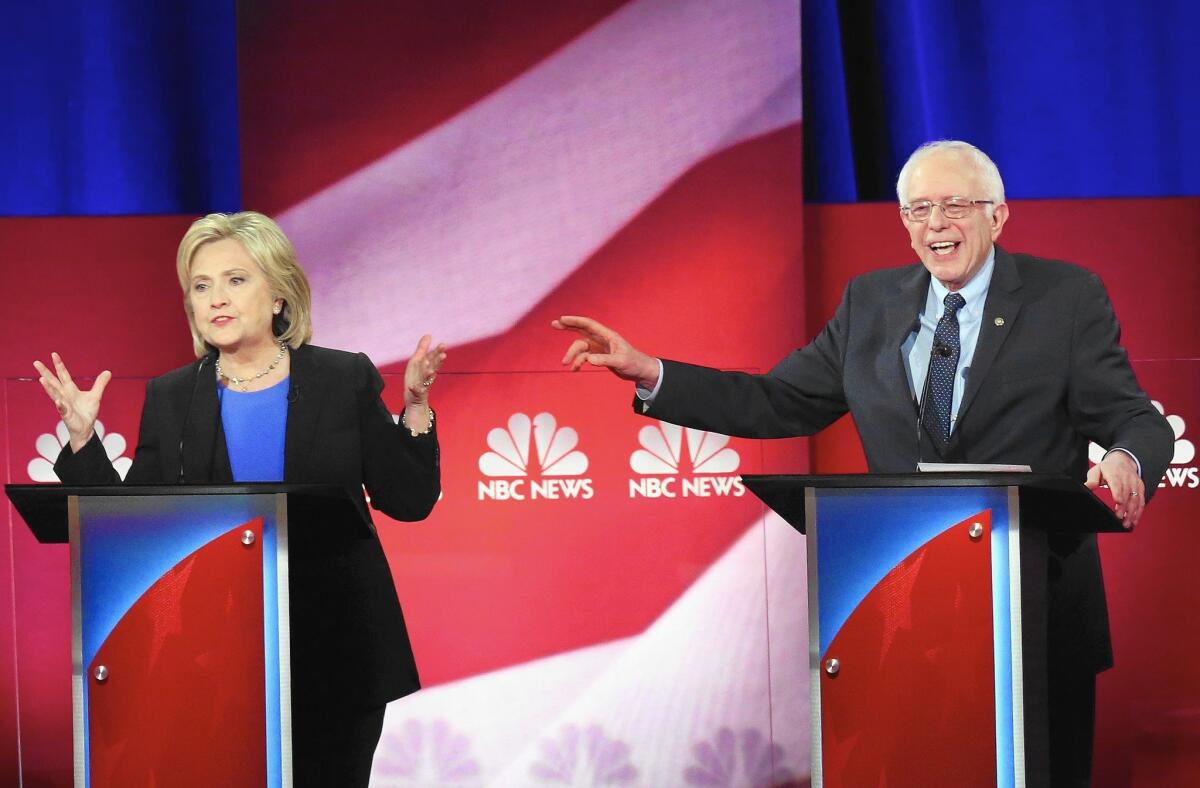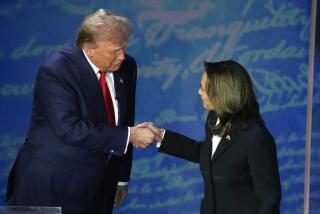Sharp Clinton-Sanders debate foreshadows primary battles

- Share via
Reporting from CHARLESTON, S.C. — With a fierceness that underscored their fight in early presidential primary states, Hillary Clinton and Bernie Sanders sparred Sunday night over guns, healthcare and the influence of Wall Street in the final debate before voters begin to determine their future.
The debate was flavored by its locale: South Carolina, which will be the fourth state to vote on the Democratic side this year, and a state whose Democrats are both strongly African American and overwhelmingly supportive of President Obama. Clinton, Obama’s first secretary of State as well as his 2008 primary opponent, repeatedly referred to her support of Obama and cast Sanders as wishy-washy toward the president’s priorities.
Clinton’s demand of loyalty to the president, and desire to retain her lofty standing among African American voters, was central to a lengthy dispute over healthcare. The national front-runner has proposed tweaking Obama’s landmark healthcare law to improve it. Sanders, the Vermont senator whose support is greatest among white and young voters, has proposed moving to a fully government-funded plan that, he announced just before the debate, would be paid for by taxes on all but the poorest Americans.
“The Democratic Party and the United States worked since Harry Truman to get the Affordable Care Act passed. We finally have a path to universal healthcare. We have accomplished so much already,” Clinton said. “I do not want to see the Republicans repeal it. And I don’t want to see us start over again with contentious debate. I want us to defend and build on the Affordable Care Act and improve it.”
In words that seemed intended to remind Democrats that Sanders is an independent and not a party loyalist, she called the healthcare measure “one of the greatest accomplishments of President Obama, of the Democratic Party and of our country.”
Sanders said Clinton’s assertion that he would gut Obamacare was “nonsense.”
“What a Medicare-for-all program does is finally provide in this country healthcare for every man, woman and child as a right,” Sanders said. Later, he cast his healthcare plan as necessary to eradicate the power of campaign donors. The increased taxes, he said, would largely be offset by savings in private insurance coverage payments.
MORE: Get our best stories in your Facebook feed >>
“Do you know why we can’t do what every other country — major country — on Earth is doing?” he asked. “It’s because we have a campaign finance system that is corrupt, we have super PACs, we have the pharmaceutical industry pouring hundreds of millions of dollars into campaign contributions and lobbying, and the private insurance companies as well.”
The same themes of continuity versus dramatic change flavored a dispute over the economy. Clinton presented herself as the chief Obama defender on the Charleston stage, albeit one who would be tough on Wall Street. Sanders, as he has throughout the campaign, cast himself as the revolutionary leader of a movement against the current political system.
“I don’t take money from big banks. I don’t get personal speaking fees from Goldman Sachs,” said Sanders, distinguishing himself from Clinton. “If Teddy Roosevelt were alive today, the old Republican trust buster, what he would say is these guys are too powerful. Break them up. I believe that’s what the American people want to see. That’s my view.”
Clinton defended her economic plan as one that has both received praise from leading economists and enmity from hedge fund operators: “I’m the one they don’t want to be up against.”
The third candidate onstage, former Maryland Gov. Martin O’Malley, made perhaps his best showing of the night when he came back against Clinton.
“For you to say there’s no daylight on this between the three of us is also not true,” said O’Malley, who has trailed far behind the other two in polling. He added that “now you bring up President Obama here in South Carolina in defense of the fact of your cozy relationship with Wall Street. ... The truth of the matter is, Secretary Clinton, you do not go as far as reining in Wall Street as I would.”
Most of the debate was spent reiterating well-worn campaign positions, so the political impact of it seemed likely to be inconsequential. But because of the site and the attention each wanted to pay to African American voters, the candidates confronted fresh issues, such as the criminal justice system and the national heroin epidemic.
NEWSLETTER: Get the day’s top headlines from Times Editor Davan Maharaj >>
Clinton, her eye on the African American voters she needs to quash Sanders, lauded the Rev. Martin Luther King Jr., said “systemic racism” had infected the criminal justice system and closed out the debate with criticism of Michigan’s delays in protecting the water supply of Flint, a majority black city.
It was inevitable given the location of the debate, close to the Emanuel AME Church where members were slain in June, that the issue of guns would arise. Continuing an unrelenting assault on Sanders’ gun record, Clinton on Sunday criticized two past actions: his 1993 opposition to the Brady bill because it called for a five-day waiting period and his vote for a 2005 measure that gave gun makers and dealers immunity from liability lawsuits. A loophole in the 1993 bill allowed Dylann Roof, the Charleston gunman, to obtain his weapon.
Defending his overall record, Sanders reiterated under questioning that his views were changing. “I would support stronger provisions,” he said of the immunity issues. Clinton suggested that he had not moved enough.
“Let’s not forget what this is about — 90 people a day die from gun violence in our country,” Clinton said. “That’s 33,000 people a year. One of the most horrific examples not a block from here where we had nine people murdered.”
A strong showing in the debate was particularly important for Clinton. She retains a strong national lead; a new NBC News/Wall Street Journal survey released Sunday put her 25 percentage points ahead of Sanders. But he has nearly eradicated her lead in Iowa, and he is ahead of her in New Hampshire, where he benefits from representing the state next door. Iowa holds its caucuses Feb. 1, and New Hampshire votes eight days later.
The end of the debate, the last joint performance for the Democratic candidates before voting begins, ushers in a frenetic two-week period of organizing and campaigning that will go a long way toward determining whether the race will be long and fractious, as it was the last time the presidency was open.
At this point, the path to the nomination for Clinton requires that she maintain her advantages in states that are more demographically diverse, such as third-voting Nevada, where she is popular among Latino voters, and South Carolina, with its important African American vote.
As she has throughout the campaign, she argued Sunday that she would be best equipped to serve as president and to defeat the Republican nominee, thus putting her in a position to rescue Democratic objectives from the Republican Congress. Toward the end of the debate, there was an uncomfortable reminder of one of her electoral strengths among Democrats: her husband, former President Clinton.
Sanders was asked about recent criticism of Bill Clinton’s extramarital activities. He said he had tried to avoid the topic, and then faced Clinton.
“You know that and we’ve been through this,” he said. “Yes, his behavior was deplorable. Have I ever once said a word about that issue? No, I have not. I’m going to debate Secretary Clinton and Gov. O’Malley on the issues facing the American people, not Bill Clinton’s personal behavior.”
The question to Hillary Clinton focused not on her husband’s past affairs but on his advisory role were she to win the presidency.
“Well, it will start at the kitchen table,” she said. “We’ll see how it goes from there.”
[email protected] | Twitter: @cathleendecker
[email protected] | Twitter: @evanhalper
[email protected] | Twitter: @LATseema
Decker reported from Los Angeles, Halper from Charleston, S.C., and Mehta from Des Moines.
MORE POLITICAL COVERAGE
Why Marco Rubio and Chris Christie are hoping to place third in Iowa
Sanders, Clinton clash on guns, healthcare and Obama legacy as Democrats debate
Hillary Clinton campaign chairman tells super PAC to ‘chill out’
More to Read
Get the L.A. Times Politics newsletter
Deeply reported insights into legislation, politics and policy from Sacramento, Washington and beyond. In your inbox three times per week.
You may occasionally receive promotional content from the Los Angeles Times.













